All the Reasons to love Granada as a place to live.
I don’t think I’ve seen anyone as passionate about Spain and Granada as John. This is a great interview in which he tells us everything (and there’s a lot!) that he loves about his adopted homeland and the wonderful city of Granada.
This is also a hugely entertaining read. Love this interview 🙂

Name: John Wolfendale
Age: 61
Country of Origin: Britain
Number of years in Spain: 30
Business: Eco Vida Homes
Hi John! Thank you for doing this interview. First of all, I’m interested in your story. You’ve been in Spain 30 years. How did you end up coming to Spain?
Let me start by saying I love Spain. It has given me everything: a beautiful family, a successful business, and a stimulating and loving environment in which to raise my children. Thank you, thank you, thank you, Spain.
In 1992 I had no direction in my life. Being a yuppie in London in my 20s was a great game and lots of fun but as I moved into my 30s it wasn’t something I could take seriously. It seemed that everyone else did take it seriously though. I remember bumping into a colleague at the weekend and I imagined that, as we weren’t in a work environment, he would relax and be himself: stop pretending…..stop acting. I was shocked to see that he really did take the yuppie job seriously and continued acting even at the weekends. These people were not my tribe and I realised I had to get out. What to do though?
I decided to learn a foreign language. As I looked into it, I realised that, in order to master a foreign language, you have to spend a lot of time where it is spoken. Having understood that I very quickly arrived at Spanish. The other candidates German, Russian, French, Mandarin etc don’t compare favourably. Spanish is the world’s fourth most popular language. Spain is sunny and its full of happy zippy people who just want to have fun and it’s just a hop on the plane.
It’s also got lots of pretty girls with long dark hair which was a particular interest I had at that time. And, as it would turn out, I would end up marrying one of them.

A few useful Resources
Buying Private health insurance in Spain. We recommend Innoinsure, they make it easy and offer different policies through various providers. And you don’t need a Spanish bank account – you can pay with foreign credit cards. More info here.
Spartan FX. Buying a house or car in Spain and need to transfer and exchange a large sum of money? More here.
Wise. For everyday transfers and exchanges of money from your home country. Nobody should be using banks anymore. More here.
Did you live anywhere else in Spain previous to Granada?
From London I managed to get a job in Madrid, still as a yuppie, and it was a contract only for one year. It gave me a story to tell my family and friends. “I’ve got a (proper) job in Madrid and I´m learning Spanish”. In fact I never intended to go back.
Actually, I had this romantic idea that, as an interesting challenge, I would move to a new city where I didn’t know anyone and didn’t speak the language a make a life for myself. I would start a business, risk everything to bring a new product to market, and make my contribution to society that way. In the end, after a few iterations and plenty of challenges, it worked out. My business is www.ecovidahomes.com
Madrid is great. There are traffic jams at 4 o clock in the morning as people are going home after their night out! Before my arrival in Madrid I had probably stayed up all night only a handful of times in my whole life and within a month of arriving in Madrid had multiplied that number several times. We used to meet at midnight to go out. But apart from the crazy nightlife……..what does Madrid have? Let’s just say I knew Madrid wasn’t my new hometown.
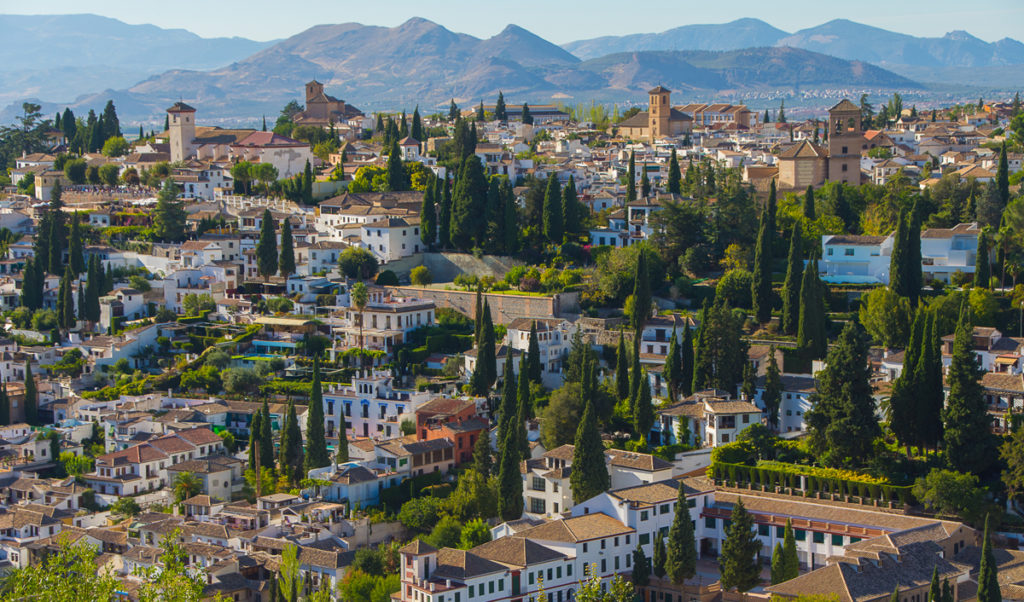
Why did you end up choosing Granada as the place you wanted to live?
Well, you’ve got to live somewhere. Why settle for where you happened to have been born? Where you live is far more important to your quality of life than what you do. Where you live needs to be a pro-active decision.
I looked at my world map, well, perhaps I am being a little dramatic, I looked at my map of Spain and saw that Granada was near the Mediterranean and also near the skiing resort of the Sierra Nevada. In the spring you can ski in your bikini and in the afternoon go to the beach in your ski suit! It looked like a pretty unique place and worth checking out.
So, in November of 1993 I travelled to the Sierra Nevada and booked myself onto a course starting in January to become a ski instructor. I was already a competent skier. At the end of January 1994 that was my new job: a ski instructor. I can remember in the mornings getting the first chair lift up the mountain to be on time for my classes, with the sun just peeping over the mountains and a clear sky over head, and I would glance at my watch and think to myself “they’re just getting on the tube in London all squashed up. Then they’ll be arriving at the office……. and all I have to do today is have fun!”
In the afternoon when I didn’t have to give classes I would go skiing together with my new friends the other ski instructors. I can remember skiing Los Tajos de La Virgen some off-piste gulley’s time after time again. There is nothing more exhilarating than testing yourself physically, winning, and doing it in the company of good friends.
It’s a great life: hard exercise and sunshine and at the end of the day, you hand in your tickets for the classes you gave, get paid, and walk across the road to the bar. You have nothing to do except smile and look forward to tomorrow. I don’t think I’ve ever had such a sense of freedom and fulfilment as I did during those days.
After the skiing season in 1994 a friend showed me Granada. He did it by taking me through the Albaicin and he judged it so that we turned a corner onto the Mirador San Nicholas without having seen it previously. It was like a revelation and a spiritual moment. The dream like Alhambra was displayed in front of me. The magnificent snow-capped mountains of the Sierra Nevada were the backdrop. The sun was setting over the plains to the West and the sky and the Alhambra were turning orange. In that moment I fell in love with Granada and decided to make it my home.
Later I was to get married in the church there and our wedding photos are taken in front of that view.
It seems to me that Granada is the most beautiful city in the world and as I take my evening and morning walks beside the river I am constantly reminded of this. With its breathtaking vistas, the mountains “shining like silver” (Washington Irving), trickling fountains in every square, it is a mystical city.
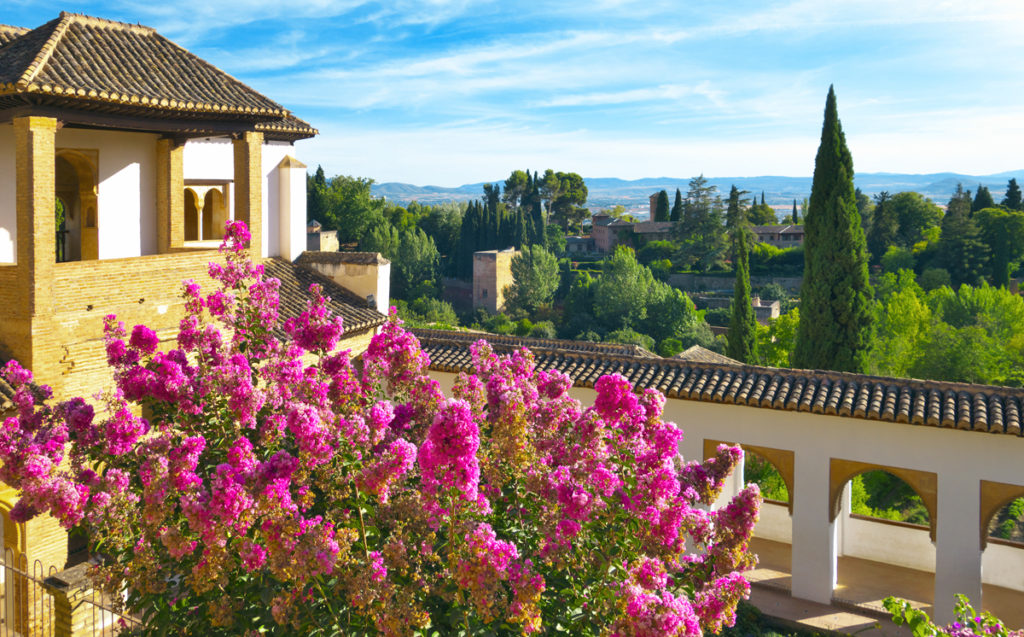
What are the Pros and the Cons of Granada as a place to live? What do you love about Granada?
Let’s deal with the only con briefly. For a few days in January, it’s a little bit too cold and for a few days in July it’s a little bit too hot.
For the rest of the year its glorious. I love the seasonal changes. You get proper huddle-round-the-fireplace winters. Springtime is full of fiestas. There are hot summer nights, and the autumn, my favourite, give you long balmy evenings.
We live in an apartment on the Carretera de la Sierra. As my job is to help foreigners build villas you might expect me also to live in a villa or at least a house with a garden which is what British people mainly want. Well, the truth is I’ve gone native. I agree with my wife who says you have to be able to walk to the shop to get your bread. I like chatting to the neighbours in the lift and gossiping in the local shops. I feel like I’m part of a community.
As a guest in Spain I try to be a little bit extra nice to my hosts. It’s too easy for them to resent a foreigner in their midst and perhaps only natural. My efforts to be extra friendly are probably not necessary because really Spain is the most friendly host culture you could hope for.
I think we live in the perfect place. We are by the river, and we can hear it gurgling from our apartment. With the window open I can lie in bed at night and watch the stars and listen to the river. It’s very quiet and peaceful. From our balcony I can watch the forest on the other side of the ravine across the river and I like to close my eyes and listen to the birds. There must be tens of different species and they’re very vocal. If I want, I can put on my walking boots, cross the river on the footbridge and walk straight up into the Sierra Nevada. In the other direction, also along the river, within 15 minutes walk, not necessarily in my walking boots, I am in the centre of a cosmopolitan city that has everything: fine dining, shops, bustling night life, and musical and cultural events.
This is how the year progresses: –
In February there is Carnavales an opportunity for putting on a silly wig and having a great night out.
Then there’s Semana Santa. The whole town lights up for a week with endless processions and trumpet playing. If I’m honest I can’t generate much enthusiasm for the sadness and weeping in the streets but it’s a spectacle and feels festive.
Las Cruces de Mayo is the 3rd May which has quietened down now. In the 1990s for a whole week there would be music and dancing in every square. People would come into town on horseback dressed in traditional costumes to look at the crosses made with flowers and to dance the sevillanas.
I remember on one occasion during Las Cruces de Mayo being absolutely mesmerised in Cathedral square. It was packed with people, late at night, and the whole square was filled with music: Maria del Monte singing Cantame, a love song. Everyone was dancing the sevillanas with such feeling. It’s a love dance and when you dance you play your part to the full looking at your partner straight in the eye, throw your head back and sing the words to them. I was spellbound. My senses were filled with the warmth of the night, the story of the song and the words and young and old people dancing the sevillanas. Everything was so sensual and real and alive.
Then in June there is Corpus: the annual feria. I was truly astonished when I saw this for the first time. There is a dedicated site on the edge of town which is used only once a year for a week. There are hundreds of marquees laid out and in each one there is a bar, food, music and dancing. The marquees are set up and sponsored by all the institutions and clubs of Granada. The scale of it is enormous to a poor Englishman who has never seen such a thing.
I remember barely being able to believe what I was seeing. In the local authority marquee, the biggest one, at one end there was a live band playing on stage at full volume with hordes of people bopping away to the music. Then, at the other end of the marquee, at the same time, was another live band, also playing their music at full volume with hordes of people bopping away to the music.
Besides the marquee zone is the biggest noisiest funfair you have ever seen in your life. The feria lasts a week and goes on all day and all night.
Did I mention the music festival of Granada? That’s in July. It’s a serious festival of music and dance using all the theatres and concert venue available with classical music and flamenco.
Then there’s the summer. It’s a less marked now but in the 1990s, in August, the town would empty. It’s just too hot to get anything done or take anything too seriously. Let’s just go to the beach.
Then it takes most of September to get back into gear because everyone’s still dazed by having a whole month off work. So there’s only really October and November to get anything done.
Granada is beautiful at Christmas. The streets are decorated with flowers and Christmas lights. The pomegranate tree in the centre (did you know the Spanish word Granada means pomegranate in English?) is lit up by a line of lights on every branch.
Even in the winter in Granada you can still promenade and have a drink outside at a terrace bar. That’s what we do as a family for fun in the evenings. We walk into town together and we stroll about with everyone else and have a drink and a tapas here and there. There’s nearly always something going on a craft fair or a book fair or some live music or something. It’s a very pleasant way to spend the evening.
Lola my wife will take my arm. The two boys will sometimes walk along together with their arms around each other shoulders. There’s no embarrassment about showing affection.
You ask what I love about Granada. I remember one incident in the first few weeks of arrival that made an impression on me. Spain had won a football match, maybe the world cup or something, and there was a crowd of young people in the street delirious with happiness (and drink) singing and chanting with joy. And from the apartment balconies above they were throwing buckets of water over the crowd in the street. And the crowd were shouting up at the people on the balconies for more and they were loving being drenched with water and at the same time jumping up and down with happiness. And I just couldn’t help thinking that in England there would be mounted police and police in riot gear and fights breaking out. I just thought these lovely good-natured people really know how to relish the moment.
While I’m on the subject of the Spanish national character I can also remember watching the running with the bulls in Vejer. It is quite an extraordinary thought for a young Englishman that the local authority would cordon off some streets and deliberately taunt and make angry some bulls and then let them loose in a public space. In England traditionally it is the local authority’s job to protect their citizens from danger not the reverse. Anyone who let a bull loose in a crowded place would be put in jail! I’m’ not sure what is says about the Spanish national character but there’s something in this that is very different from the UK.
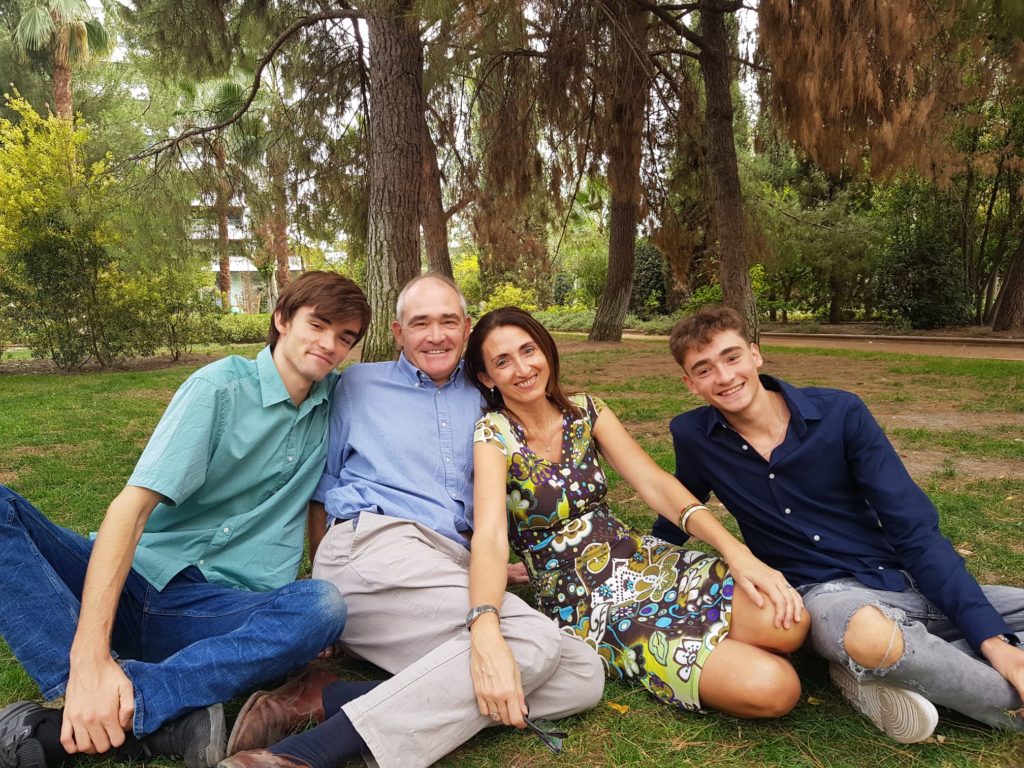
Please use 3 words to describe Granada.
Poesia, Alegría, Romance
You’ve raised children in Granada. Can you tell us about the schooling experience in Spain? Do you have any advice for anyone with children moving to Spain?
In Spain, if you have children, you’re a hero. You’re a hero in the queue at the supermarket, on the bus, and in restaurants.
If you’re a child in Spain you know you are loved. You get told you are loved all the time and also how beautiful you are. You are greeted properly by name. You are hugged. You are included in everything. In Spain its normal and positive to talk to children in the lift or in shops or in the street. It isn’t an indication that you are a sexual predator.
In Spain there are no bed times…..well, maybe during term time but children go where their family goes and they do what their family does. In the summer that might well be lingering around the supper table (the sobre mesa), perhaps out in the street, for many hours late into the night with the neighbours and the children running around together.
Your child’s experience at school depends on the particular teacher they get and that teacher’s personality. Forget what it says on the school website and forget the interview with the headteacher. The only thing that counts is the particular teacher that teaches your child and there’s no way you can influence that. You can’t meet them first or get an opinion from another parent. This is true whether the school is, private, state, or concertado. So, given that the most important factor is outside of your control. Just go to the nearest school and hope for the best. We spent months investigating all of them, didn’t like any of them much, went to the local one and were absolutely delighted.
I remember on one occasion nearly welling up. Alex our youngest must have been about 7 or 8 and he was returning to school after the summer holidays and he ran towards his teacher and she got down and gave him a hug. My own experience at that age was that I would have been lucky not to get caned. I love Spain.
The educational system both here and, I imagine, in the UK is designed by university professors to suit embryonic university professors. We’ve got one of those. His education has been astonishingly perfect for him. He was diagnosed (that’s what they say in Spain…“diagnosed” like some kind of medical ailment!) a child of exceptional ability by the local authority psychologist at about the age of 7. We were told “Your son will be given everything he needs to reach his full potential. Our nation’s future depends on these children”. They wrote us a letter I can’t remember the exact words…….you know how they write “Esteemed citizen blah blah…” But it was absolutely true. His teacher was sent on a special course so as to be able to teach him properly. He was taken out of maths classes for individual maths tuition. Sometimes they just played chess. We received a letter from the local authority warning us as parents that this child was the nation’s future and not to mess things up! He went to a trilingual school where he was taught in French, English and Spanish. I remember watching over his shoulder once and I asked “oh are you doing your French homework and he said no I’m doing history. At 14 he was selected for ESTALMAT which is a special programme for children talented at maths and he spent Saturday mornings being taught maths by university professors (young, dynamic, funny maths professors). He then did an International Baccalaureate as well as the Spanish baccalaureate. All of this was paid for by the state. He won a place to study maths at Cambridge and turned it down in favour of Granada university. Ha! …..good for him don’t you think?
We’ve also got one who isn’t a university professor type and with him let’s say our experience of the educational system was mixed. “He has trouble concentrating” we were told. My response: “No he doesn’t…not when he’s fishing. He can spend hours and hours concentrating on his fishing tackle and rods and we can’t get him to come to lunch. You see (and actually I didn’t have the courage to really say this bit but I wanted to…), he’s not a “university professor type“ or even more I wanted to say “the problem is your classes are boring”.
To be fair the classes are too large for the teachers to be able to individualise their teaching methodology. I am sure most of them are doing their best in difficult circumstances. The interesting thing is that the classes in private schools are just as large round about 30, so where’s the benefit in going to a private school? Smaller classes are the one thing you might pay for in my opinion but it’s not available.
What they do have in Spain for the non-university professor types is the FP (formacion professional). It’s an alternative to the baccalaureate (equivalent of “A” levels). Our boy is a very able and intelligent boy without being an embryonic university professor the FP is perfect for him. He’s doing the FP in sports. It’s very practicable. He actually does mountain biking, hiking, horse riding and swimming. There’s very little time spent in the classroom and that’s where someone like him should be… out in the hills in the fresh air getting strong. He can still finish up with a full degree at York University in the UK if he wants to. St Johns York recognise years 3 and 4 of the FP as the equivalent of years 1 and 2 of their degree programme in certain subjects. So, if he wants to, and this is a few years ahead of us, he can do year 3 at York and graduate with a full degree from St Johns York.
In any case in terms of child development (forgive the pompous expression) what happens at home is far more important than what happens at school. We sat around the table and had lunch together as a family nearly every day for years. That’s possible in Spain. State school hours are 8 to 3 (with a proper sandwich for elevenses) and that’s it for the day. Lunch is at home at 3.30. It works very well. In the afternoon you organise, and pay for, the basketball and Taekwondo classes or whatever you want. At a private school where your children stay all day you have to put up with whatever they can muster up. Our boys were able to join the best extra curricula activities available. One trained with the junior division of the Granada professional basketball team. The other was a black belt in Taekwondo at 14.
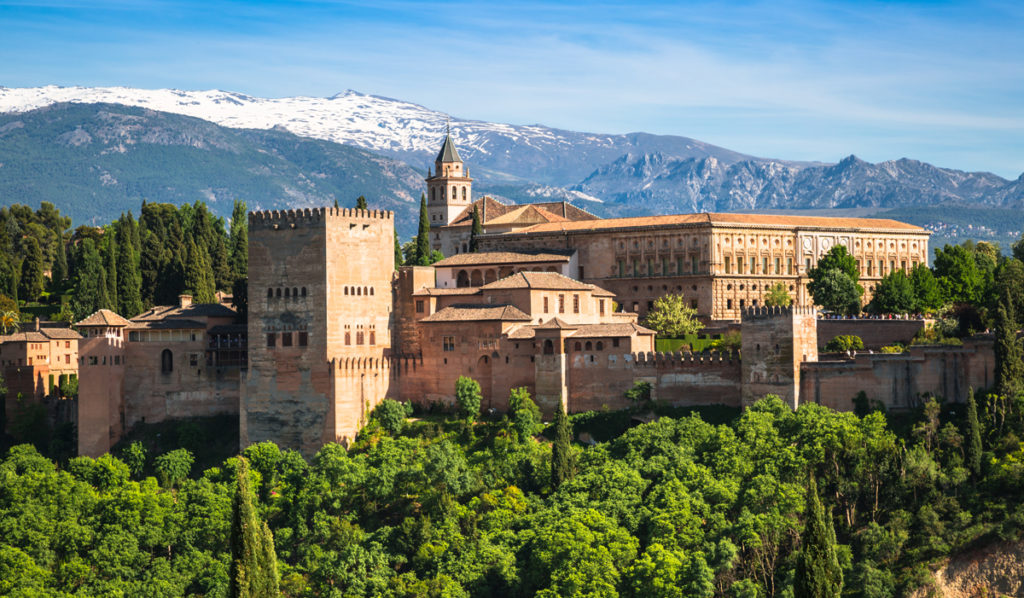
Having been in Granada most of your life I imagine you’re fully integrated in Spain and Spanish culture. How was your adaptation to life in Spain and what are the biggest changes you’ve undergone since coming to Spain? Would you ever see yourselves moving away from Spain and living somewhere else?
Yes I`m what other people might call fully integrated. I have cooked my Spanish mother-in-law a Spanish rice in her kitchen and won her praise. I’m still an Englishman living in Spain though.
And I would say that one of the things I most like about living in Spain is the great advantage being a foreigner. You know how, at least in British society, people judge you as soon as you open your mouth? British people make a hundred suppositions about your background and education as soon as you speak. I expect something similar happens in Spain although a lot less and in a different way. And I don’t like it. Well, when you’re a foreigner you’re in a separate category all on your own. People don’t look down on you and they don’t look up at you. You’re not quite one of them. It’s kinda like the rules don’t quite apply to you. It’s probably the same for a Spaniard live in say, Keswick. It’s just so much easier to get on with people. I love being a foreigner.
What changes have I undergone. Well, I am baffled in the UK by everything closing down at 5.30. That’s just the beginning of the afternoon right?
I am a big fan of lunch. When I am at work at 2.30 we all go to a restaurant for a menu del dia. The restaurant is packed with people who halfway through their working day. The food is wholesome and arrives quickly. You get a three-course meal for 10 euros or so. And we talk. We talk about our families and get to know each other. We talk about work and solve problems and we laugh and have fun. We have a proper rest, and we get nourished. At 16.30 more or less we return to work until 19.00 or 20.00.
One of my problems is trying to explain to our foreign clients that we are not available for meetings at 2.30 which for them is after lunch and the beginning of the afternoon. Once I persuaded a colleague to have a cheese sandwich with me for lunch and a meeting at 2.30 because that’s what the client requested. Afterwards he said. “I’m not doing that again John. Tell the clients we are not available for meetings at 2.30”. I tried to make a joke about the cheese sandwich, but he was perfectly serious. And I agree with him.
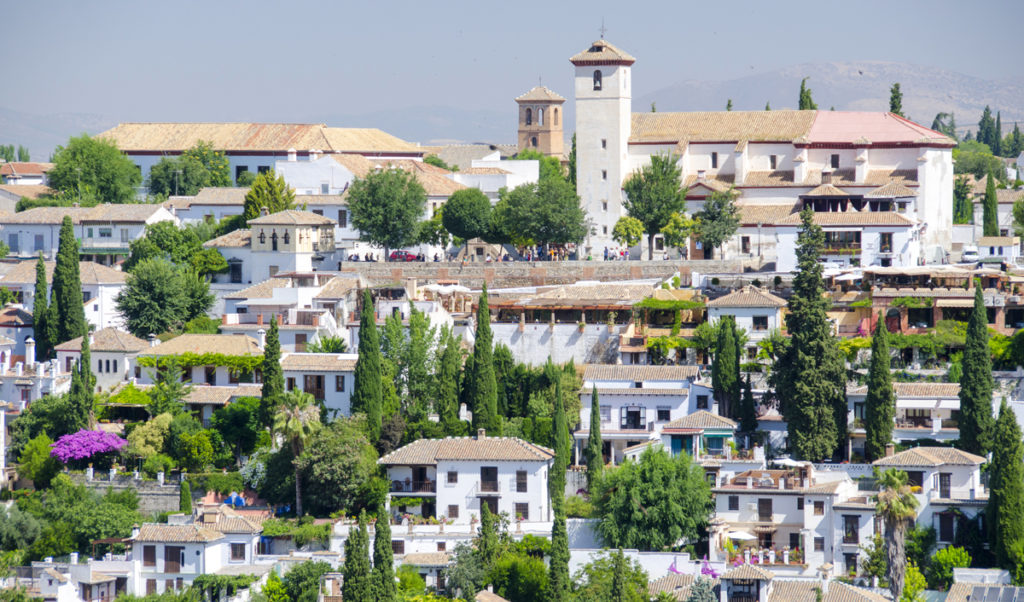
You’ve lived in in Granada 30 years now. How has Granada changed over that time?
Well, I can no longer drive my car just about anywhere is the city centre, park on the pavement, and walk into the shop.
They stopped Las Cruces de Mayo. It’s morphed into some children dancing on a platform outside of the town hall. A great shame even if it was getting a little out of hand.
I’m not sure Granada has changed that much. They built a ring road to take the traffic out of the city centre and now they have built another ring road around that.
There’s a pet shop called Wolfy near where we live on the Carretera de la Sierra, which was the only road up to the Sierra Nevada before they built the ring road, and I remember driving past it in 1993 because Wolfy has always been my nick name and the letter W only really exists in Spanish for foreign words. The sign and the pet shop are still there. Little did I know then that this was to become my neighbourhood.
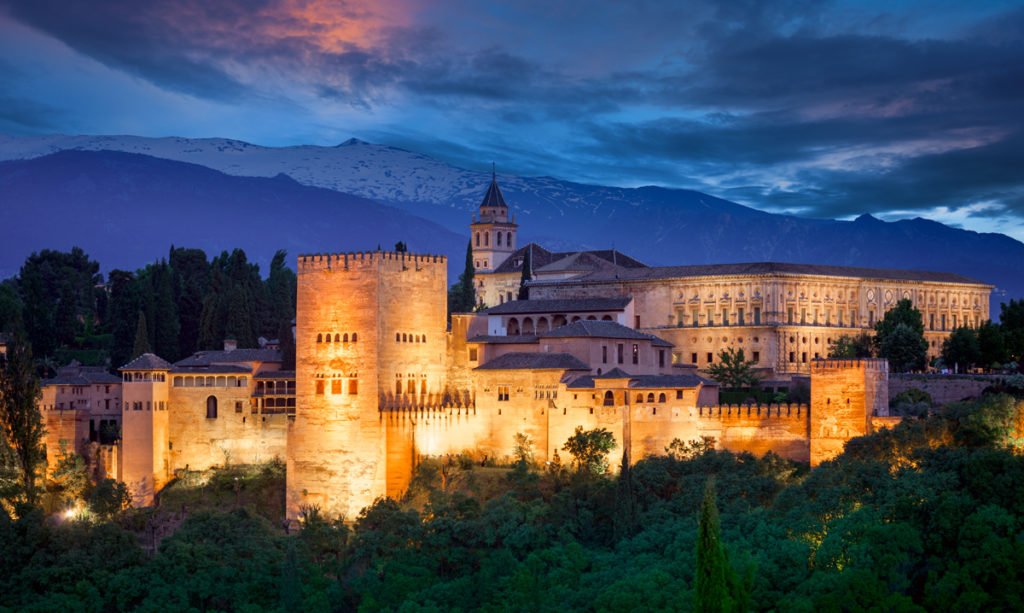
What are your favourite activities in Granada and the surroundings?
We have been able to do all the adventure sports as the boys have grown up. They are competent wind surfers, kite surfers, skiers, and snow boarders. We have done a lot of hiking and sleeping under the stars. We’ve done scuba diving, potholing, rock-climbing, cross-country skiing, kayacking and white water rafting. My wife doesn’t like adventure sports, so she didn’t come. She wasn’t there to say “be careful” and stop them learning how to evaluate risk. They still got all her cuddles at home. I think the whole arrangement worked very well.
I love their close relationship with their Mama. When they get up from the table they lean down and give her a kiss. It reminds of a pizza advert and I want to say “ciao Mamma!” but er…wrong cultural reference!
It’s about 40 minutes to the beach so often we spent the day on the beach with a picnic at Salobreña or La Herradura swimming, reading, snorkelling, playing in the waves and paddle boarding.
There’s nothing better than lunch at a chiringuito: a Mediterranean tomato garnished with sea salt and olive oil, freshly grilled sardines, and a bottle of chilled wine on the beach in the shade.
Within 30 minutes of leaving home I can be in the Sierra de Huetor in magnificent solitude with no sound except the birds, unspoilt forests surrounding me and stretching out to the Sierra Nevada.
Within 20 minutes I can be cold water swimming in the snow melt reservoir at Guejar Sierra.
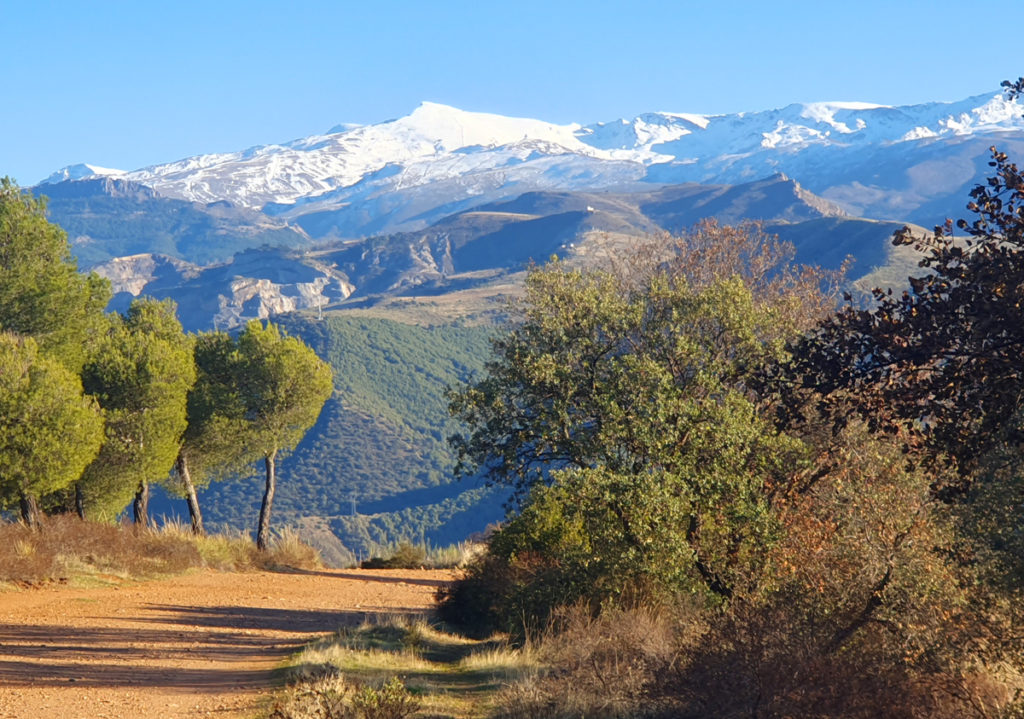
I’ve heard that Granada has become quite popular as an Expat base in recent years. Any thoughts on that?
I didn’t know that. I don’t have any thoughts on it.
Granada is famous for its Tapas. What are your favorite tapas bars in the city?
Well, the thing is that the food is good everywhere. The tapas bar scene is constantly evolving. The point is that there is really a different attitude to food in general. Food is about fresh high-quality ingredients and carefully judged seasoning. Seasoning is salt, pepper, olive all, and maybe some garlic. You don’t need Dijon mustard, egg yolk, and beer and all that complicated stuff in a salad dressing.
A tapa exists because it’s just too uncivilised to have a drink without also having something tasty to eat. In Granada you get a free tapa included with each drink. As a principal the tapa gets a little bit better with each subsequent drink you buy. It’s an incentive to get you to stay because the normal thing to do is go from bar-to-bar tapas bar hopping.
In London if you go to a Spanish restaurant for tapas you buy plates of Spanish food. These are really raciones or at least that’s what they’re called in Granada. In Granada a tapa is a small complimentary snack to go with your drink. It translates the word lid as if it goes on top of your glass. A plate of food such as you get in a Spanish restaurant in London is more correctly called a racion.
There used to be a bar in La Chana that gave you unlimited tapas. It was all fried fish. If you finish your plate they put another one down. Eventually, and sooner than you think, you get tired of eating fried fish.
Then there are those that cater for students that emphasise bulk over quality the idea being that the tapa is enough food so you save money by not having to order raciones as well.
There’s nothing more civilised than a glass of fino (dry sherry) and a tapa. As I say this I think of a couple at the feria each on a magnificent house. She in her feria dress with the cloth draped over the horses’ back. He in his waistcoat and Cordobes hat…both sharing a glass of fino. They have such style. You will still see this at the ferias in Sevilla, Cordoba, Granada and Malaga and many of the smaller towns.
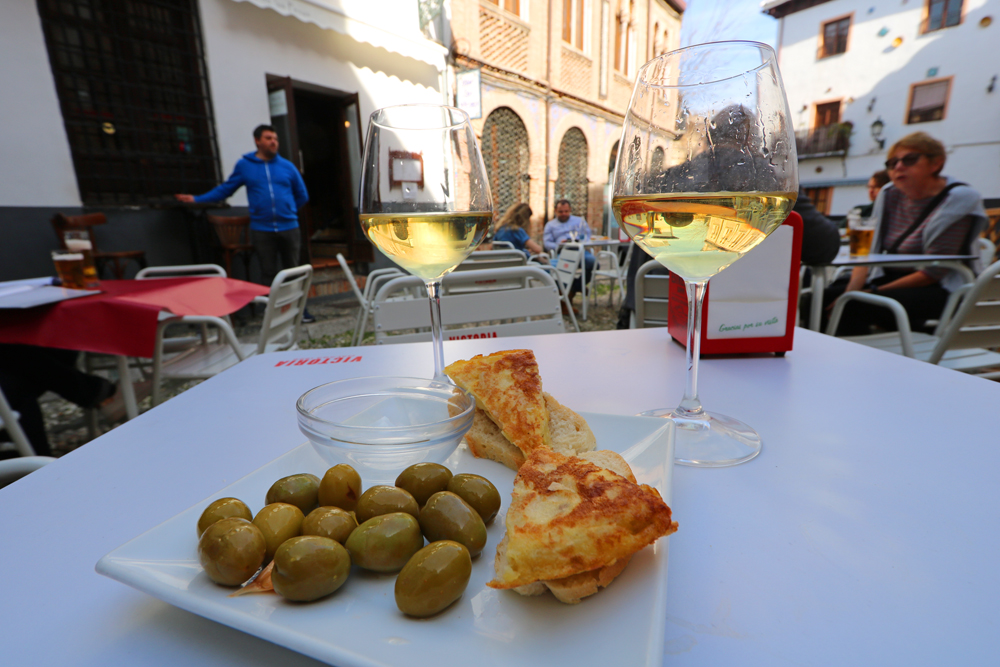
Do you have any tips (do’s and don’ts) for foreigners looking to settle in Granada? What neighbourhoods do you recommend?
Bring your own job or your own money. Wages are relatively low locally but people are happy with less. If you’re on a foreign-type wage you can live like a king. And it’s a great place to be poor. You can live like a king anyway!
The whole city is walkable. We live on the outskirts but its only 15 minutes walk from the city centre. In the UK if you live 15 minutes from the city centre then you’re in the city centre.
I think we live in the best part by the river near the Sierra, near the edge of town right next to the motorway, and only a few minutes walk from the centre. There are a few bars and restaurants scattered around…a great location.
Thank you for doing this interview John!
Want to be interviewed? Send us an email or leave a comment below.
Related: What makes Valencia a great place to live in Spain?
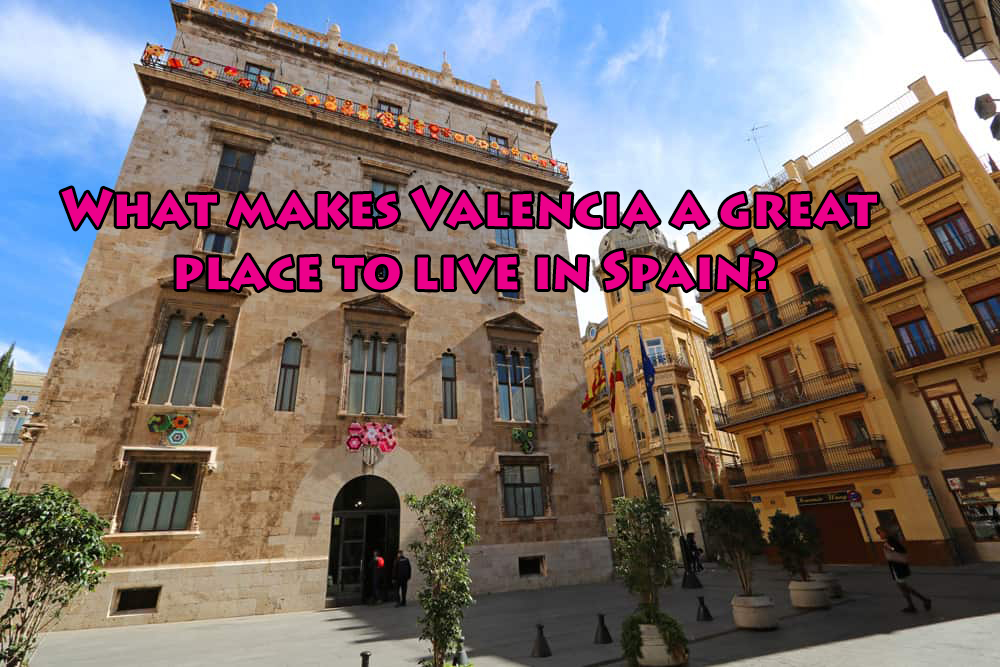
Related: What’s it like living in Montefrio?
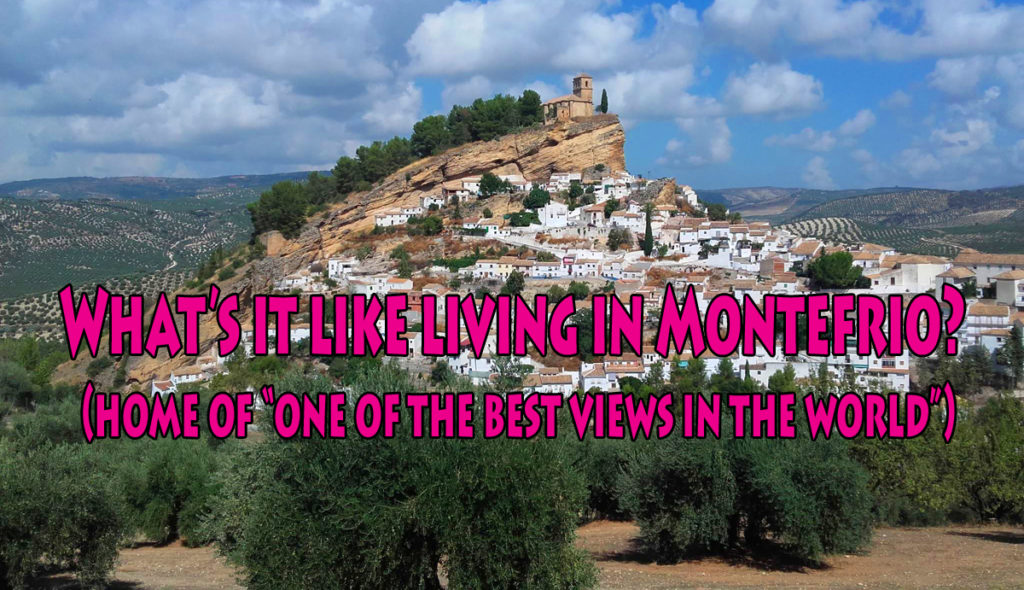
Related: What’s it like living in the Canary Islands?
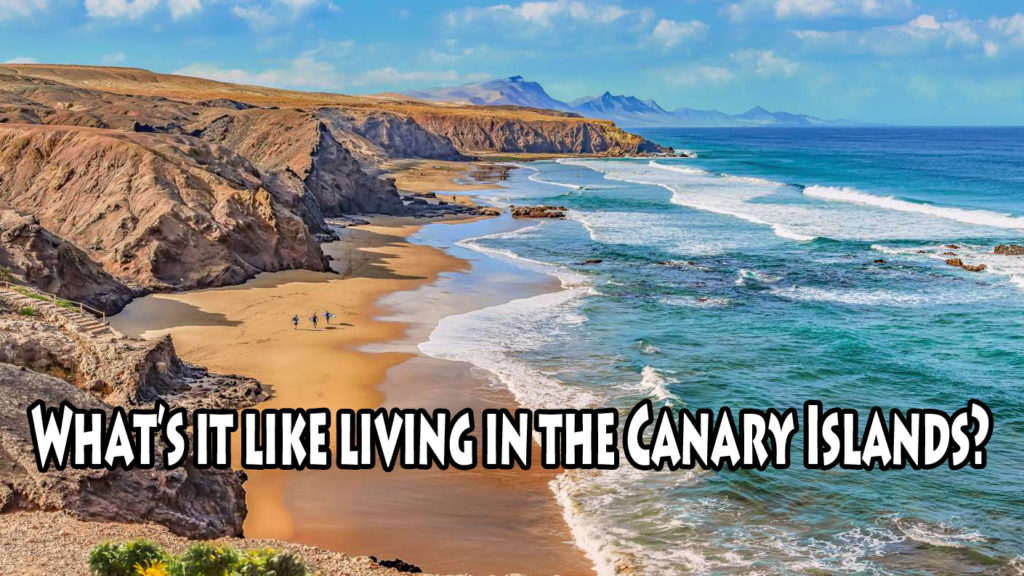

We are on our way soon! I was a student in Granada in the 70s! I lived in the Albaucin.I’m half Spanish. We will look for a country house but I’ld like to stay over in Granada . Nos Veremos ahi! Cristina y Hans